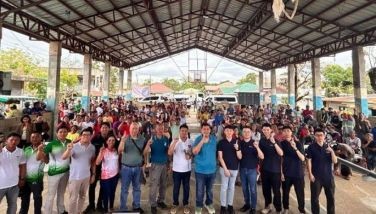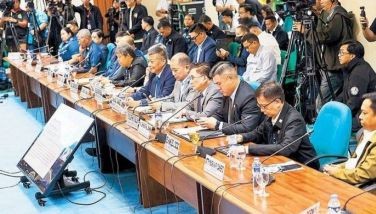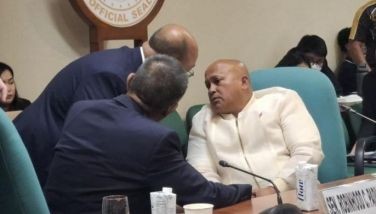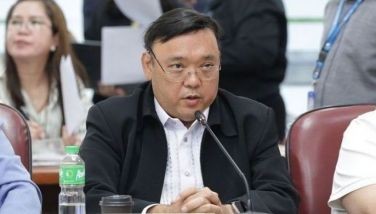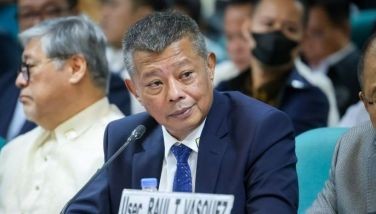Pass-through fees

On Sept. 25 last year, President Marcos ordered a stop to the collection of various forms of fees from delivery vehicles for simply passing through any road that was not built by local governments.
Either BBM’s Executive Order No. 41 was not cascaded down to the local government units, which collect the fees, or else the national government gets little respect from the independent LGU republics.
With Marcos’ third State of the Nation Address just around the corner, I asked a prominent businessman for his SONA priority wish list. He mentioned three, one of which is for a genuine end to the so-called pass-through fees, which he says continue to be collected.
Apart from city and municipal governments, the fees are collected by barangays and in some areas by the police. Seeing the inability of the national government to enforce its own order, and to avoid the hassle, delivery drivers simply pay up.
EO No. 41 took into account the complaints of businessmen, that the pass-through fees contribute to logistics costs, which are already too high compared to those in several neighboring countries.
As in most fees collected by the government from the private sector, the pass-through fees are in turn passed on by traders to consumers.
The fees are among the reasons for high food inflation, particularly in Metro Manila and other urban centers that source most of their food supply from distant farming areas.
Metro Manila gets most of its rice from Central Luzon, vegetables and fruits from La Trinidad in Benguet as well as Laguna and Cavite, chicken and pork from Rizal and beef from Batangas. Think of how many places the delivery trucks must pass through and pay such fees before the commodities reach the markets of Metro Manila.
Even when farm gate prices of tomatoes plunged so low some farmers simply dumped their crops, tomato retail prices in Metro Manila did not fall significantly.
* * *
Bringing down prices of agricultural commodities was another item on the SONA priority wish list of the businessman. These commodities are raw materials not only for the major food processors but also for micro and small enterprises that account for the majority of businesses in this country.
With Marcos 2.0 consistently getting the lowest survey ratings in taming inflation, and food inflation driving the high inflation rate, EO 41 was issued to stop the collection of the pass-through fees.
The EO cites a provision in Republic Act 7160, the Local Government Code, that expressly prohibits such fees: Section 133(e) of RA 7160, which states that “the taxing powers of local governments shall not extend to the levy of taxes, fees, and charges and other impositions upon goods carried into or out of, or passing through, the territorial jurisdictions of LGUs in the guise of charges for wharfage, tolls for bridges or otherwise, or other taxes, fees, or charges in any form whatsoever upon such goods or merchandise.”
According to Malacañang, these include fees for vehicle stickers, discharging, delivery, market and entry permits.
RA 7160 imposes penalties for violations. Despite this, EO 41 is proving ineffectual. The national government may have to begin imposing sanctions on LGUs that defy the order.
LGUs are also providing the biggest roadblocks to a third item on the businessman’s priority list: ease of doing business.
Local and foreign business groups alike continue to complain about the difficulty of opening, operating and even closing a business in the Philippines compared with neighboring countries.
Not surprisingly, these countries are drawing far higher levels of foreign direct investment. With many businesses decamping from China, Vietnam is reportedly getting so much FDI these days it is starting to experience inadequacies in providing requirements such as electricity.
Businessmen in the Philippines acknowledge the efforts of the Anti-Red Tape Authority in improving ease of doing business. ARTA, however, is up against a local government leviathan where systems are designed so that personnel from the barangay up can collect grease money before anything gets done.
The businessman said LGUs should develop a mindset similar to the mission of the Philippine Economic Zone Authority: to attract as much investments as possible that can create meaningful employment. If people have decent jobs or livelihoods due to economic activities that can be attributed to good governance, wouldn’t this be good for the local politicians?
* * *
As part of logistics improvements, the businessman is hoping for a cargo railway system – now in the works, but still several years away from coming onstream.
A problem with possible short-term solutions is steep domestic cargo shipping cost, which the businessman said is among the highest in Asia and should be regulated.
Another problem is the horrid traffic in Metro Manila, which is costing billions in lost productivity. The businessman noted one aspect that has not been highlighted – that Metro Manila must be the only megacity in the world without a numbered bus system, which allows the dispersal of waiting areas along specific routes and reduces traffic buildup at bus stops.
The foreign chambers, for their part, have come up with a list of 21 pieces of legislation that they hope will get priority at the SONA.
No. 1 on the list is the lifting of foreign ownership restrictions, which will require Charter change. As of last weekend, however, the reliable word from the Senate is that Cha-cha is dead in this Congress. Lawmakers can instead work around the constitutional prohibitions to further ease the restrictions – something they have already done in other recently enacted laws.
Some of the other items on the list should also prove unappealing if the Marcos administration is serious in its rightsizing objective: the creation of more executive departments and offices.
When the government needs to create jobs, it creates new agencies, new provinces and cities, and now new barangays, which are quickly packed with beneficiaries of political patronage or members of political dynasties.
Since merit is rarely considered in patronage-driven job generation, government efficiency has not improved commensurately with the bureaucratic bloat.
For every problem, a new department. Do all those extraneous fees go to fattening the bureaucracy?
BBM said eliminating pass-through fees would improve ease of doing business and cut transport and logistics costs – one of the eight pillars in his socioeconomic agenda. Surely this should prove more doable than his aspiration for rice at P20 a kilo.
- Latest
- Trending













